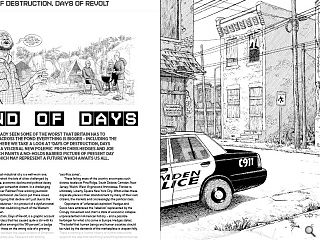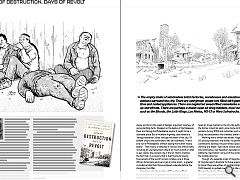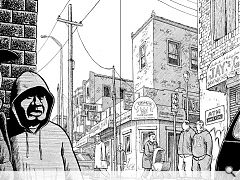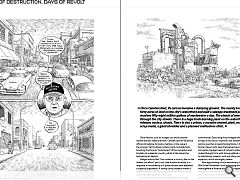Days of Destruction, Days of Revolt
24 Oct 2012
We’ve already seen some of the worst that Britain has to offer but across the pond everything is bigger – including the problems. Here we take a look at ‘Days of Destruction, Days of Revolt’, a visceral new polemic from Chris Hedges and Joe Sacco which paints a no-holds barred picture of present day America which may represent a future which awaits us all.
The story of the post-industrial city is a well-worn one, from Glasgow to Detroit the tale of cities challenged by population collapse, economic decline and political decay seem familiar and yet somewhat distant. In a challenging new polemic however Pullitzer Prize-winning journalist Chris Hedges and cartoonist Joe Sacco put these issues front and centre, arguing that decline isn’t just due to the departure of key industries – it is product of a dysfunctional economic system that could bring much of the Western world crashing down.Days of Destruction, Days of Revolt, is a graphic account of America’s underclass that has caused quite a stir with its clarion call for rebellion amongst the ’99 percent’, a badge of honour worn by those on the wrong side of a growing disparity in wealth between the upper echelon of American society - and everybody else. Peppered with striking hand-drawn imagery from their travels the tome recounts the experiences of the authors as they traverse so called ‘sacrifice zones’.
These failing areas of the country encompass such diverse locales as Pine Ridge, South Dakota; Camden, New Jersey; Welch, West Virginia and Immokalee, Florida to, ultimately, Liberty Square New York City. What unites these disparate places is their abandonment by many of their own citizens, the markets and (increasingly) the political class.
Opponents of ‘unfettered capitalism’ Hedges and Sacco have embraced the ‘rebellion’ represented by the Occupy movement and chart a state of economic collapse unprecedented in American history – and a possible harbinger for what is to come in Europe. Hedges states: “The belief that human beings and human societies should be ruled by the demands of the marketplace is utopian folly. There is nothing in human history or human nature that supports the idea that sacrificing everything before the free market leads to a social good.”
Camden, New Jersey, is perhaps the poster child for this decay and forms the meat of Hedges argument courtesy of some startling facts. Situated on the banks of the Delaware River and facing the Philadelphia skyline it ought to be a desirable place. But a multilane highway, described as a ‘savage laceration’, slices through the heart of the city. Of benefit only to the commuters who sail overhead, “in and and out of Philadelphia, without seeing the human misery below.” That misery is reflected in various dire official stats, including an unemployment rate of as much as 40% in what is, per capita, the poorest city in the US. Not to mention the fact that, in a country that is itself home to twenty five percent of the world’s prison inmates, one in three African Americans ends up in jail at some point – a greater cumulative total than those enslaved a decade before the American Civil War.
Camden is also the location of ‘Transitional Park’, an encampment of fifty tents for the homeless that is symptomatic of a city where forty percent of residents live below the poverty line. Visiting one of the hundreds of open air drugs markets in the city the authors chart how the former industrial giant, once home to 36,000 shipyard workers during WWII and industries such as Campbell’s Soup, has descended into a lawless ‘penal colony’.
Warning that a similar fate awaits ‘huge pockets’ of the US (and by extension, the world) if a permanent underclass is allowed to develop, the pair strike a pessimistic tone, warning of a ‘bleak’ near future where cities and states fall into bankruptcy, neo-feudalism develops and civic leaders battle the ‘decimation’ not just of the working classes but the middle class too.
Though of a separate order of magnitude the travails of Camden aren’t dissimilar to those experienced closer to home, there are echoes of northern England in the 1,500 derelict or gutted row homes in the city for instance. Stripped by teams of scavengers for their valuable metals on a thriving black market the properties swiftly flood once unprotected from the elements - the stench of sewage from flooded basements in many streets is palpable.
Other factors, such as budget cuts and economic decline are also wearily familiar. Camden laid off 168 police officers to balance its books, fuelling a crime wave in the process. Yet the book contains some contradictions, branding the force as “reminiscent” of the corruption and brutality of a despotic country whilst at the same time bemoaning its decline.
Hedges admits that “non-violence is a luxury few on the streets can afford” yet it isn’t clear if police brutality is in response to this anarchy or if police actions have alienated a sceptical population. A strong union presence makes it unaffordable for the City to employ more officers without incurring crippling debts in any case.
It is in their conclusions as to why the city is in the mess it’s in however that the authors are at their most controversial, Describing the privileged elite who pull the strings in the city as ‘overlords’ and ‘predators’, the text pulls no punches in apportioning blame. Citing the case of former mayors who have themselves become embroiled in corruption, Hedges hears of concerns state funds are being routed through firms with strong political connections to build vanity projects, such as a shiny new waterfront aquarium, which are largely useless.
Now approaching its first anniversary the Occupy Wall Street Movement is still occupying the pre-eminent thoroughfare of finance but not much appears to have changed on the streets of Camden. Nevertheless, if Hedges and Sacco are to be believed, this may be the quiet before the storm and everything we’ve come to take for granted about our world could be in line for a shake-up.
Authors note:
The creation of a permanent, insecure and frightened underclass throughout the global economy is the most effective weapon to thwart rebellion and resistance as our economy worsens. Our corporate overlords understand this. Huge pools of unemployed and underemployed, whether in Britain or the United States or China, blunt labor organizing, since any job, no matter how menial, is zealously coveted. Workers are now told they have to be competitive in a global marketplace -- which means being competitive with prison labor in China or garment workers in Bangladesh that make 22 cents an hour.
As state and federal social welfare programs, especially in education, are gutted, we create a wider and wider gulf between the resources available to the tiny, oligarchic elite and the deprivation and suffering visited on our growing and permanent underclass. Access to education, for example, is now largely defined by class in the United States. Those living in the sacrifice zones we write about went first. We are next. The book is a kind of warning of what is about to happen to all of us as we are made to kneel before the dictates of the marketplace.
The beating down of workers, exacerbated by the recent refusal to renew unemployment benefits for hundreds of thousands of Americans and the breaking of public sector unions has transformed those in the working class from full members of society, able to participate in its debates, the economy and governance, into terrified people in fragmented pools preoccupied with the struggle of private existence.
This same process was begun by Tony Blair and “New” Labour. Those who are economically broken usually cease to be concerned with civic virtues. They will, history has demonstrated, serve any system, no matter how evil, and do anything for a salary, job security and the protection of their families. And this is the goal here and in the rest of the global economy including Britain.
Chris Hedges
|
|
Read next: Carbuncle Awards 2012
Read previous: Westfield Avenue
Back to October 2012
Browse Features Archive
Search
News
For more news from the industry visit our News section.
Features & Reports
For more information from the industry visit our Features & Reports section.






